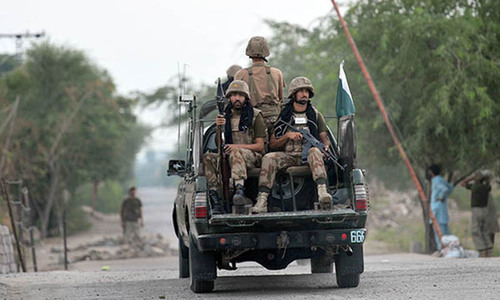President Arif Alvi has suggested that the Pakistani government could consider giving an amnesty to those members of the banned Tehreek-i-Taliban Pakistan (TTP) who have not remained involved in "criminal activities" and who lay down their weapons and agree to adhere to the Pakistani Constitution.
He made the indication during an interview on DawnNews programme 'Khabar Se Khabar' aired on Friday.
In the context of the Afghan Taliban's assurance that they would not allow Afghan land to be used for terrorism against Pakistan, host Nadia Mirza asked the president whether the TTP was no longer a threat for Pakistan.
"TTP [remains] a threat," President Alvi responded.
But he suggested it had been conveyed to Pakistan by the "second- or third-tier leadership" of the Afghan Taliban, which last month captured control of the country following a lightning blitz, that, "We (Afghan Taliban) will declare that they (TTP members) can live here in [Afghanistan] but they must not do any activity against Pakistan."
Moreover, he said, the Pakistani government stated that it would "consider whether an amnesty should be given or not" to the TTP members who laid down their weapons and accepted the Constitution of Pakistan.
At this, Mirza interjected and asked the president: "General amnesty?" to which Alvi replied: "Yes yes, Pakistan will think about it [for] the people who lay down their weapons."
"Does that mean there will be a pardon for people like Maulvi Fazlullah?" Mirza asked, referring to the ruthless former TTP chief who was killed in a drone strike in Afghanistan in 2018.
"I am not taking anyone's name," Alvi responded. "I am talking about the people who, before anything, have not remained involved in criminal activities. The government could consider making a declaration of amnesty [for the people] who forgo their TTP ideology and want to come with the intention of adhering to the Pakistani Constitution."
Also read: TTP in disarray after halt to Indian funding for the group: Fawad Chaudhry
Such an amnesty could be one of the ways to "establish peace", the president said.
"It can't happen that we fully disown the however many thousand Pakistanis who are abroad," he added. "So one way or the other will have to be adopted." It wasn't clear whom the president was referring to at this point.
For years, the TTP unleashed deadly attacks on urban centres across Pakistan from their bases along the Afghan border, where they provided shelter to an array of global jihadist groups including Al Qaeda.
But a massive military offensive launched in 2014 largely destroyed the group's command and control structure, dramatically reducing insurgent violence throughout Pakistan.
Sporadic attacks targeting security forces, however, continue. Just last Sunday, the TTP claimed responsibility for a suicide attack near a Frontier Corps (FC) check post in Quetta in which four paramilitary personnel were martyred and 21 others injured.
During the interview, President Alvi also said it would be a "bonanza" for Pakistan if peace was established in Afghanistan because of the immense development opportunities in the war-ravaged country.
He also said the Afghan Taliban's reported desire for their country to join the China-Pakistan Economic Corridor and other development projects could be "definitely considered" because it would benefit the entire region.
Regarding the new administration in Afghanistan, Alvi said the Taliban should follow the examples of 'Sulah Hudaibiya' and anti-apartheid revolutionary Nelson Mandela to grant amnesty to rivals and bring all stakeholders to the negotiating table.
He noted that the Taliban had made it clear that "India would no longer be allowed to use the Afghan land", adding that this would bring an end to the ease with which New Delhi used to conduct anti-Pakistani activities through the border.

















































